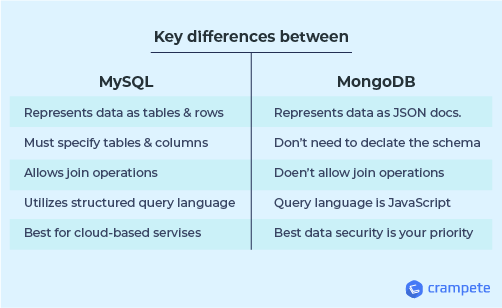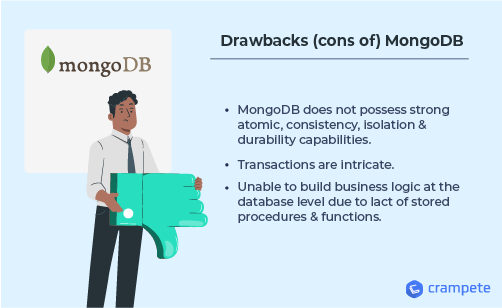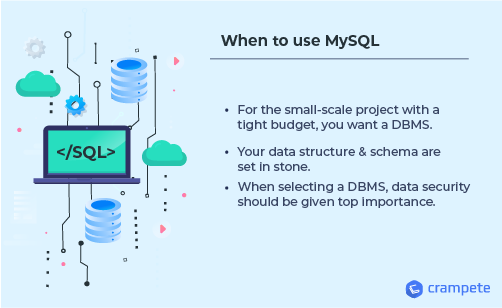
MongoDB vs. MySQL: What's the difference?
Two of the most popular and competitive database providers for web applications are MySQL and MongoDB. Both are database management systems (DBMS) that let you gather information from a website or application and produce reports, but they have different designs. MongoDB is a document-based system, whereas MySQL is an antiquated table-structured system.
TABLE OF CONTENT
- What is MongoDB?
- What is Mysql?
- MongoDB: Why Use It?
- MySQL: Why use it?
- Aspects(pros) of MongoDB
- Aspects(pros) of Mysql
- Differences(Comparison) between MySQL and MongoDB
- The drawbacks(cons) of MongoDB
- The drawbacks(cons) of Mysql
- When to use MongoDB?
- When to use MySQL?
- Which Should I Pick?
What is MongoDB?
For storing large amounts of data, MongoDB is a document-oriented NoSQL database. A database called MongoDB first became popular in the middle of the 2000s. It fits the definition of a nosql database.
Because this form of DBMS employs dynamic schemas, records may be created without beforehand specifying the structure, including the fields, types, and values.
By adding new fields or removing existing ones, MongoDB enables you to modify the structure of records, or documents as we refer to them.
What is Mysql?
A well-known and commonly used DBMS system is MySQL. The name was inspired by the daughter of co-founder Michael Widenius with the first name My. Under the terms of the GNU GPL, MYSQL's source code is accessible. Oracle Corporation owns and manages the project.
Since it largely uses the relational database paradigm, it is an RDBMS (Relational Database Management System). Database management is facilitated, and it is more versatile.
You must pre-define your MySQL database structure in accordance with your needs and establish rules to guide the relationships between the columns in your tables.
Key Differences
- Unlike MySQL, which represents data as tables and rows, MongoDB represents data as JSON documents.
- While you must specify your tables and columns in MySQL, you do not need to declare the schema for MongoDB.
- While MySQL allows JOIN operations, MongoDB does not.
- While MySQL utilizes the Structured Query Language, MongoDB's query language is javaScript (SQL).
- While MYSQL is a fantastic option if you have structured data and require a typical relational database, MongoDB is the best option if you have unstructured and/or structured data with the potential for quick developement.
- MongoDB is the greatest option for you if the majority of your services are cloud-based, while MYSQL is the ideal choice if data security is your top priority.

MongoDB: Why Use It?
The major justifications for utilizing MongoDB are as follows:
- mongodb is incredibly adaptive to the needs and circumstances of the actual world of business.
- It is possible to run queries to have certain document fields returned.
- MongoDB supports field-based searches, range-based queries, regular expressions, etc. for locating the stored data.
- MongoDB is an extremely user-friendly DBMS that is simple to scale up or down.
- MongoDB enables you to store working temporary datasets in internal memory, which is significantly quicker.
- On any field, MongoDB provides both main and secondary indexes.
- You may utilize MongoDB as a GridFS, sometimes referred to as a file storage system.
- MongoDB provides a number of ways to aggregate data, including aggregation pipelines, map-reduce processes, and single goal aggregation commands.
- You may store any sort of file, regardless of its size, in MongoDB without it having an impact on our stack.
- In essence, javaScript objects are used by MongoDB in place of the method.
- In order to store data that will when-to-use-mysql?expire at a specific time, MongoDB enables special collection types like TTL (Time-To-Live).
- JSON is the name of the dynamic database structure used by MongoDB.
- To make MongoDB searches perform better, indexes may be established. A MongoDB document's fields can all be indexwhen-to-use-mysql?ed.
- Replication: MongoDB's replica sets can offer high availability.
- In the event of hardware failure, MongoDB may run across numerous servers, balancing the demand and/or replicating data to keep the system operational.
MySQL: Why use it?
Here are a few significant justifications for choosing MySQL:
- supports features like Scale-Out and Master-Slave Replication
- Offload Reporting, Geographic Data Distribution, etc. are supported.
- When utilized for read-only applications, the MyISAM storage engine has very little overhead.
- support for frequently used tables' memory storage engine
- Queries that are frequently used are cached
- MySQL may be readily learned and fixed from a variety of sources, incwhen-to-use-mongodb?luding blogs, white papers, and books.
Aspects(pros) of MongoDB
- Collections are found in every database, and documents are found in collections.
- Each document can differ from another and have a variable amount of fields. Each document may vary in size and content from the others.
- MongoDB's document structure is based on how programmers create their classes and objects in their chosen programming languages.
- A schema doesn't have to be specified for rows. The fields might instead be made up as needed.
- MongoDB makes it easier to store arrays, more complicated structures, and describe hierarchical connections.
Aspects(pros) of Mysql
- DBMS driven by the community is called MySQL.
- Compatible with a wide range of platforms and employing all popular languages and middleware
- Support for multi-version concurrency control is provided.
- Conforms to ANSI SQL requirements
- Enables trigger- and log-based SSL replication
- Compatible with ANSI-SQL2008 and object-oriented
- Multilayer structure with separate components
- Using kernel threads and complete multithreading
- Servers are provided in client-server or embedded DB models.
- Provides integrated tools for space analysis and query analysis
- Any quantity of data, up to 50 million rows or more, may be handled by it.
- Numerous versions of UNIX and Linux support MySQL.
Differences(Comparison) between MySQL and MongoDB
The following are key distinctions between mongodb and MySQL:
MongoDB |
MySQL |
| Data is presented in MongoDB as JSON documents. | In MySQL, data is organized into tables and rows. |
| You don't have to define the schema in MongoDB. The papers you just drop in need not even have the same fields. | Before you can save anything in MySQL, you must specify your tables and columns, and every entry in a table needs to contain the same columns. |
| Although MongoDB has a predefined structure that may be designed and followed, it can also have alternative structures if a collection needs to contain distinct documents. | For database access, MySQL employs Structured Query Language (SQL). The schema cannot be altered. |
| C++ and C are supported languages. | The languages C++, C, and JavaScript are supported. |
| MongoDB, Inc. is responsible for ongoing development. | Oracle Corporation works on development constantly. |
| Built-in replication, sharding, and auto-elections are supported by MongoDB. | Both master-slave replication and master replication are supported by MySQL. |
| If no index is identified, each document in the collection must be searched to identify those that match the query expression. | The database engine must seawhen-to-use-mongodb?when-to-use-mongodb?rch the whole table if no index is provided in order to identify all pertinent rows. |
| Available GPL v2 commercial license OD | Commercial licenses for GNU AGPL 3.0 are available OD. |
| MongoDB is the ideal choice for you if the majority of your services are hosted on the cloud. | MYSQL is the best option if data security is a top priority for you. |
| Schema design is unrestricted in MongoDB. | Before you can save anything in MySQL, you must establish your tables and columns. The same columns must be present in every row of a table. |
| JavaScript is the query language used by MongoDB. | The Structured Query Language is used by MySQL (SQL). |
| JOIN is not supported by MongoDB. | JOIN operations are supported by MySQL. |
| It can manage vast amounts of unstructured data. | When working with huge databases, MySQL is considerably slower than MongoDB. |
| Internet of things, real-time analytics, content management, and mobile apps | clear template for structured data |
| No schema declaration is necessary, lowering the danger of an attack because of design | SQL injection attack danger |
| An excellent option if your unstructured or organized data has the potential for quick and faster expansion. | A wonderful option if you want a classic relational database and have organized data. |
The drawbacks(cons) of MongoDB
Here are several drawbacks of utilizing MongoDB
- When compared to many other RDBMS systems, MongoDB does not possess strong Atomic, Consistency, Isolation, and Durability capabilities.
- MongoDB transactions are intricate.
- Due to the lack of stored procedures and functions in MongoDB, you are unable to build business logic at the database level, as you can with RDBMS systems.

The drawbacks(cons) of Mysql
Here are several drawbacks of utilizing Mysql
- System catalog-related transactions are not ACID compliant.
- The system catalog may occasionally become harmed by server crashes.
- Stolen procedures cannot be cached.
- Most MySQL tables that are utilized in a procedure or trigger have already been pre-locked.
When to use MongoDB?
- You need instant, quick, and automated data recovery with excellent data availability.
- You work with BigData in many places geographically.
- You want to cut the expense of a schema migration because your current one is unreliable.
- Most of your services require a native scale-out design since they are cloud-based.
When to use MySQL?
- For the small-scale project with a tight budget, you want a DBMS.
- Your data structure and schema are set in stone.
- There are a lot of transactions going on.
- When selecting a DBMS, data security should be given top importance.

Which Should I Pick?
MySql
A relational database would be better suitable for applications like an accounting system that require multi-row transactions. If you require a conventional relational database and have organized data, MySQL is a great option.
MongoDB
Real-time analytics, content management, IoT, mobile, and other application types are all good fits for MongoDB. If you have organized or unstructured data with room for quick expansion, this is the best option.
Because of its adaptability, performance, dependable data protection, and simplicity in data administration, MySQL is highly organized. Your performance problem may be solved, interaction made easier, and robustness ensured with proper data indexing.
However, you should use MongoDB if your data is unstructured and difficult to manage, or if pre-defining your schema is difficult for you. Additionally, MongoDB will be a big assistance if you need to manage a lot of data and store it as documents.

Accelerate Your Career with Crampete




